
Look to Windward is a science fiction novel by Scottish writer Iain M. Banks, first published in 2000. It is Banks' sixth published novel to feature the Culture. The book's dedication reads: "For the Gulf War Veterans". The novel takes its title from a line in T. S. Eliot's poem The Waste Land:

Harry Hart "Pat" Frank was an American newspaperman, writer, and government consultant. Perhaps the "first of the post-Hiroshima doomsday authors", his best known work is his post-apocalyptic novel Alas, Babylon (1959), which depicted the outbreak of a nuclear war and the struggles of its survivors in a small central Florida town.

Reagan's War is a 2002 book by Peter Schweizer.

Marguerite Higgins Hall was an American reporter and war correspondent. Higgins covered World War II, the Korean War, and the Vietnam War, and in the process advanced the cause of equal access for female war correspondents. She had a long career with the New York Herald Tribune (1942–1963) and as a syndicated columnist for Newsday (1963–1965). She was the first woman to win a Pulitzer Prize for Foreign Correspondence awarded in 1951 for her coverage of the Korean War. She subsequently won Long Island University's George Polk Award for Foreign Reporting for articles from behind enemy lines in Korea and other nations in 1952.

A Long Way from Chicago is a "novel in stories" by Richard Peck, published September 1, 1998 by Dial Press.

The Bridge at No Gun Ri is a non-fiction book about the killing of South Korean civilians by the U.S. military in July 1950, early in the Korean War. Published in 2001, it was written by Charles J. Hanley, Sang-hun Choe and Martha Mendoza, with researcher Randy Herschaft, the Associated Press (AP) journalists who wrote about the mass refugee killing in news reports that won the 2000 Pulitzer Prize for investigative journalism and 10 other major national and international journalism awards. The book looks in depth at the lives of both the villager victims and the young American soldiers who killed them, and analyzes various U.S. military policies including use of deadly force in dealing with the refugee crisis during the early days of the war.

Chase is Dean Koontz's first hardcover novel, originally written under the name K. R. Dwyer and released in 1972, it was revised and reissued in 1995 within Strange Highways.
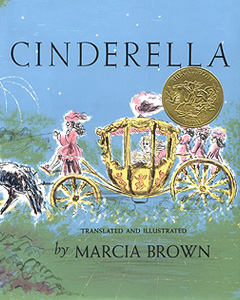
Cinderella, or the Little Glass Slipper is a book adapted and illustrated by Marcia Brown. Released by Charles Scribner's Sons, the book is a retelling of the story of Cinderella as written by Charles Perrault, and was the recipient of the Caldecott Medal for illustration in 1955. The book takes place in France, in a palace similar to other Cinderella stories.

The Battle of White Horse Hill took place during the Korean War. White Horse Hill in the Iron Triangle, formed by Pyonggang at its peak and Gimhwa-eup and Cheorwon-eup at its base, a strategic transportation route in the central region of the Korean peninsula.
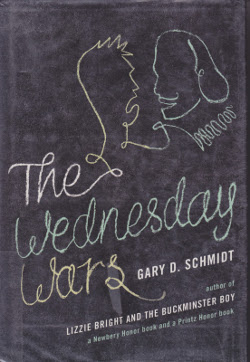
The Wednesday Wars is a 2007 young adult historical fiction novel written by Gary D. Schmidt, the author of Lizzie Bright and the Buckminster Boy. The novel is set in suburban Long Island during the 1967–68 school year. The Vietnam War is an important backdrop for the novel. It was given a Newbery Honor medal in 2008, and was also nominated for the Rebecca Caudill Young Reader's Book Award in 2010.
James Winston Brady was an American celebrity columnist who created the Page Six gossip column in the New York Post and W magazine; he wrote the In Step With column in Parade for nearly 25 years until his death. He wrote several books related to war, particularly the Korean War, in which he served as a United States Marine Corps officer.

Rage: A Love Story is a young adult novel by Julie Anne Peters. It was first published in hardback in 2009. The story follows Johanna who falls in love with Reeve who has suffered much abuse in her life. When their relationship struggles, Reeve begins to physically abuse Johanna who stays with her girlfriend despite the violence. The cover is a reference to the famous pop art image by Robert Indiana.
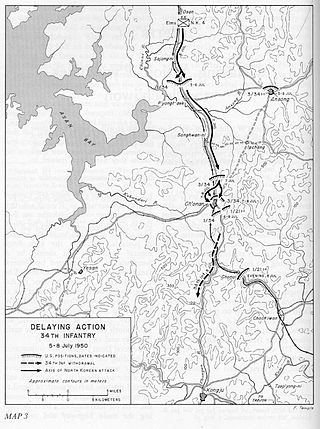
The Battle of Pyongtaek was the second engagement between United States and North Korean forces during the Korean War, occurring on July 6, 1950 in the village of Pyongtaek in western South Korea. The fight ended in a North Korean victory following unsuccessful attempts by American forces to inflict significant damage or delays on advancing North Korean units, despite several opportunities to do so.

Hold Back the Night is a 1956 American war film about the Korean War based on the 1951 novel by Pat Frank, who had been a war correspondent in Korea. The film was directed by Allan Dwan; his third film with John Payne and his third film about the United States Marine Corps, the others being Abroad with Two Yanks (1944) and Sands of Iwo Jima (1949).

The Fold (2008) is a young adult novel by An Na. It is her third novel following Wait for Me and A Step from Heaven.

Pachinko is the second novel by Harlem-based author and journalist Min Jin Lee. Published in 2017, Pachinko is an epic historical fiction novel following a Korean family who immigrates to Japan. The story features an ensemble of characters who encounter racism, discrimination, stereotyping, and other aspects of the 20th-century Korean experience of Japan.
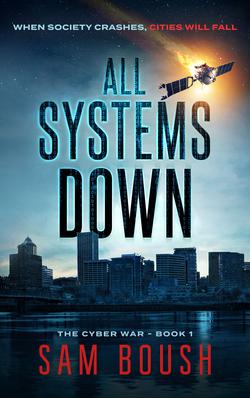
All Systems Down is a 2018 techno-thriller novel by American writer Sam Boush. The novel deals with a cyberwarfare attack on Western countries, focusing on three groups of characters in the United States.
"Ma Qui" is a 1991 fantasy/horror story by American writer Alan Brennert. It was first published in the Magazine of Fantasy & Science Fiction.
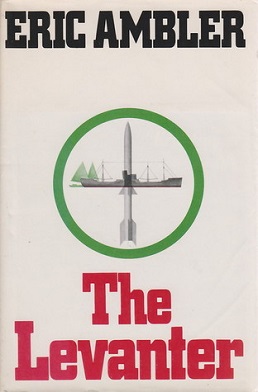
The Levanter is a 1972 novel by Eric Ambler.
Skinship is a collection of eight short stories written by Yoon Choi and published on August 17, 2021 by Alfred A. Knopf. The stories give insight into the Korean American experience and are told from different generations of immigrants, giving the book as a whole and all-encompassing perspective. It has been praised for showing the complexity of the human experience, language, and relationships as cultures collide.

















